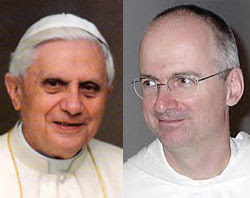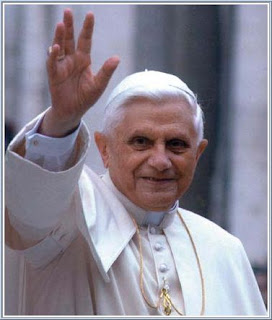 CASTEL GANDOLFO - Christ did not limit himself to taking just the lowest place at the table, explained Pope Benedict XVI on Sunday. Jesus, taught the Pope, repeatedly offers humanity "a model of the humility and of free giving" and showed the world "radical humility" by accepting the Cross.
CASTEL GANDOLFO - Christ did not limit himself to taking just the lowest place at the table, explained Pope Benedict XVI on Sunday. Jesus, taught the Pope, repeatedly offers humanity "a model of the humility and of free giving" and showed the world "radical humility" by accepting the Cross.
Joining the many pilgrims and faithful in the attendance in the courtyard at the Castel Gandolfo for the Angelus were participants in the annual conference being held for members of the association of the Pope's ex-students. There was also a group from the Pontifical North American College, who were greeted specially by the Holy Father after the Angelus.
In his catechesis prior to the Marian prayer, the Pope reflected on the passage from St. Luke's Gospel read in Sunday's Liturgy. In the reading, Jesus is invited to the house of a leader of the Pharisees for a meal where, based on what he witnesses, he is inspired to tell the parable which teaches of humbling onesself and taking "the lowest place" at the table.
The Lord's words were not meant to be a lesson in the etiquette or on the hierarchy of authorities, said Benedict XVI, "He insists rather on a decisive point, which is that of humility: 'everyone who exalts himself will be humbled, but the one who humbles himself will be exalted'."
The parable can also be read as a perspective of the man's position in relation to God, explained the Pope, the "lowest place" representing "the condition of humanity degraded by sin, a condition which can only (be) liberated by the incarnation of the Only-begotten Son."
Citing his encyclical Deus Caritas Est, the Pope taught that "For this, Christ himself 'took the lowest place in the world - the Cross - and by this radical humility he redeemed us and constantly comes to our aid'."
Turning to Jesus' suggestion at the end of the parable that it should be the poorest and most excluded, those who have no way of repayment, who are invited as guests, Pope Benedict stated that the "true recompense, in fact, in the end, will be given by God, 'who governs the world ... We offer him our service only to the extent that we can, and for as long as he grants us the strength'.
"Once again, then, we look to Christ as a model of the humility and of free giving: from him we learn patience in the midst of the temptations, meekness amidst offenses, obedience to God in sorrow in the hope that He who invited us might say: "Friend, move up to a higher position.' the true good, in fact, is being close to Him."
Remembering Sunday's feast of the "greatest among the prophets of Christ," St. John the Baptist, the Pope closed by praying for his intercession and that of Mary "to guide us on the way of humility, to become worthy of the divine recompense."












